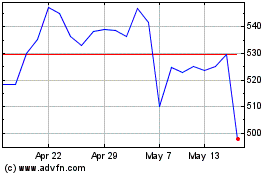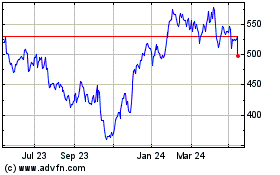Airlines Start To Count The Cost Of EU Emissions Trading Scheme
28 September 2011 - 1:32AM
Dow Jones News
Airlines are facing a bill of up to EUR1 billion to implement
the E.U.'s Emissions Trading Scheme when they are included in the
European carbon market in January, and they are planning to absorb
much of the extra costs initially in an effort to prevent
exacerbating a renewed downturn in the sector.
From next year, any airline flying into or out of the E.U. will
be required to hold permits that allow them to emit one ton of CO2
for every flight landing and taking off in the European Union.
In an effort to help an industry united in its opposition to the
emissions scheme, the European Commission this week said it will
give airlines permits to cover 85% of their CO2 emissions in 2012
for free. Between 2013 and 2020, airlines will get 82% of the
permits for free, with 15% auctioned to meet additional needs and
3% set aside for new entrants to the scheme.
However, Standard & Poor's estimates that this will still
mean airlines have to pay about EUR975 million to fund the rest of
their trading scheme needs next year alone, assuming a carbon price
of EUR13 per ton of carbon dioxide.
The figures are backed by Europe's major airlines. Deutsche
Lufthansa AG (LHA.XE) said it expects to have to buy permits to
cover about 30-40% of its ETS needs, at a cost of between EUR150
million and EUR350 million. Europe's largest budget carrier,
Ryanair Holdings PLC (RYA.DB), has forecast its bill will top EUR15
million to EUR20 million in 2012, while easyJet PLC (EZJ.LN) said
it estimates costs to be GBP25 million between January and
September alone. British Airways, part of International
Consolidated Airlines Group S.A. (IAG.LN), and Virgin Atlantic
declined to give estimates, although Virgin said it would be a
"significant cost" to the business.
The E.U.'s rationale for its carbon scheme is to try and combat
climate change by capping CO2 emissions. It is bringing airlines
into the scheme because although the industry is only responsible
for between 2% and 3% of global emissions, that proportion is
expected to grow rapidly in coming years as air travel becomes more
accessible.
However, the scheme is coming at a bad time for airlines, which
already face high fuel bills and taxes and the latest signs of a
renewed downturn in travel demand amid the sovereign debt crisis
and weak consumer and business sentiment. Given that background,
airlines will be hard pressed to push the extra costs on to
travellers.
The European Commission has calculated that the Emissions
Trading Scheme will push prices up between EUR2 and EUR12 a ticket,
but until that can be passed on airlines face an added burden in
the first year.
A spokesman for easyJet said the airline would absorb the
increased cost initially as it usually takes 18 months to pass on
the costs in full without forcing customers onto rival airlines.
Virgin Atlantic echoed those comments.
The scheme applies to all airlines operating into and out of the
E.U., but a group of U.S. airlines is arguing in the European
Courts of Justice that it shouldn't apply to non-E.U. airlines.
United Continental Holdings Inc.'s (UAL) President and Chief
Executive Officer Jeff Smisek said earlier this month that the
airline "has no choice but to comply" and that it is already doing
so with data collection processes. However he added: "We are
obviously suing and we hope we win."
"(The) fact is that today China, India, the USA and even
medium-sized countries such as Algeria are expressing strong
opposition and heavy complaints against EU-ETS," a Lufthansa
spokesman said. He said it was important that there is a global
aviation solution to climate change, otherwise competition
distortion would arise.
By Kaveri Niththyananthan, Dow Jones Newswires; 4420 7842 9299;
kaveri.niththyananthan@dowjones.com
Easyjet (LSE:EZJ)
Historical Stock Chart
From Apr 2024 to May 2024

Easyjet (LSE:EZJ)
Historical Stock Chart
From May 2023 to May 2024
